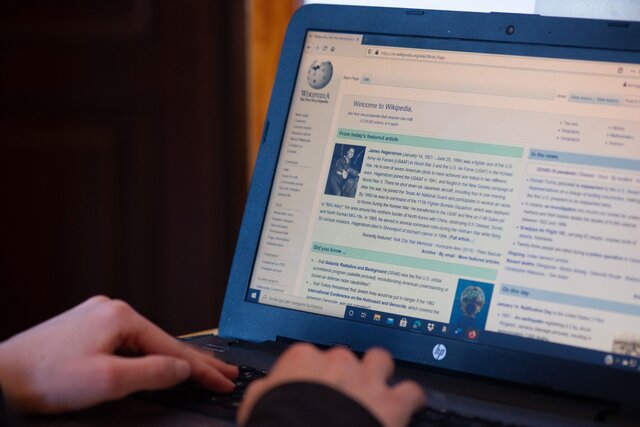A useless add-on. Russia’s Wikipedia replacement is touting its integrated AI — but the results are underwhelming
Manage episode 489130073 series 3381925

Earlier this month, Wikipedia scrapped its experiment with AI-generated article summaries following backlash from the site’s editors. Meanwhile, Russia is actively promoting its heavily state-censored online encyclopedia, Ruwiki, where a built-in neural network is touted as a key advantage over competitors. The results, however, have been far from impressive. Meduza examines how Russia’s homegrown Wikipedia alternative is trying to integrate AI — and why it still stumbles over “inconvenient” questions.
On June 2, the Wikimedia Foundation announced a limited experiment to introduce AI-generated summaries in Wikipedia articles. It didn’t go well. The backlash from the editor community was swift and overwhelmingly negative. “This would do immediate and irreversible harm to our readers and to our reputation as a decently trustworthy and serious source,” one editor wrote. The next day, Wikimedia announced it was calling off the experiment — at least for the time being.
Unlike in the West, the use of AI in Russian online encyclopedias hasn’t sparked much debate among editors — at least not publicly. On the contrary, the rollout of these tools is actively promoted using all available resources.
Even though we’re outlawed in Russia, we continue to deliver exclusive reporting and analysis from inside the country.
Our journalists on the ground take risks to keep you informed about changes in Russia during its full-scale invasion of Ukraine. Support Meduza’s work today.
On June 10, Russia’s government services portal, Gosuslugi, sent out a mass email campaign advertising the Ruwiki platform. Some users also received push notifications on their phones, Agentstvo reported. The message read:
A new Russian online encyclopedia with a built-in neural network has launched — Ruwiki. It will help you find precise answers to your queries, generate summaries in different styles, add details, and even read the text aloud, if needed.
In fact, Ruwiki has been around since the summer of 2023, when it launched in beta. Its official release came in January 2024. Essentially, it’s a fork of the Russian-language Wikipedia — with any content that fails to meet Russian censorship standards removed. “Most articles, unless they touch on political topics, are copied word-for-word from Wikipedia,” T-invariant reported last year.
The AI integration isn’t exactly breaking news either — the feature was added back in October 2024. Unlike Wikipedia’s short AI-generated summaries, Ruwiki’s neural network is embedded in its search function. According to the site’s developers, it uses YandexGPT to generate responses based on Ruwiki’s existing articles, include links to those articles it pulls from, and suggest additional related content.
other Wikipedia replacements
Ruwiki’s articles have undergone heavy-handed censorship. In many cases, the encyclopedia still includes information about people or events unwelcome to the Russian authorities — but it’s all filtered through a tightly controlled, propagandistic lens. The war in Ukraine, for example, is described in the very first sentence as “an indirect military confrontation between Russia and the U.S. and NATO.”
There’s an entry for Ukrainian President Volodymyr Zelensky, but the second paragraph emphasizes that his presidential term has ended. “New elections were not held,” the article notes — without explaining why.
The article on late opposition politician Alexey Navalny has also been rewritten from Russian-language Wikipedia to fit the Kremlin’s narrative. His 2020 poisoning with Novichok is described as “supposed.” A line about him ranking fourth on a 2020 list of Russia’s most trusted public figures is followed by a claim that his popularity stemmed from “criticism of coronovirus [sic] restrictions” — misspelled and without a source.
Sometimes there are odd additions. The article on Navalny’s Anti-Corruption Foundation (FBK) painstakingly lists all 29 investigative films the group released between 2015 and 2023 — including Don’t Call Him Dimon, about the wealth of former President Dmitry Medvedev — along with each video’s view count as of March 2023. The Russian-language Wikipedia article, by contrast, mentions just six of these investigations and includes no viewer stats.
Interestingly, now that it’s gained access to pre-approved and censored content from Ruwiki, the Yandex neural network has grown bolder than when Meduza tested it a year ago. It no longer dodges “inconvenient” questions by asking users to “change the topic,” and it’s even willing to answer queries about what Putin can be criticized or praised for — questions it once refused to touch. But in both cases, the responses remain vague and uninformative.
According to the encyclopedia itself, Ruwiki now contains more than two million entries. And it seems editors haven’t been able to keep up with revising or purging unwanted content. As a result, YandexGPT is still happy to recommend VPN services or answer direct questions like “How can I bypass website blocks in Russia?” — while tacking on a reminder that such actions may be illegal under Russian law.
Overall, Yandex’s neural network feels like a useless add-on to an already broken encyclopedia. It clearly lacks the data to generate coherent answers, stumbles over absurd propagandistic language, and churns out contradictory or unverified claims. Unlike Wikipedia, however, Ruwiki doesn’t have an editorial community that’s capable of pushing back.
censorship and chatbots
67 episodes



